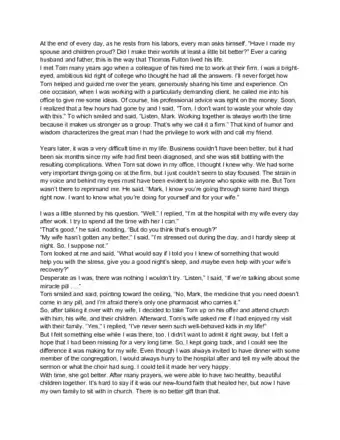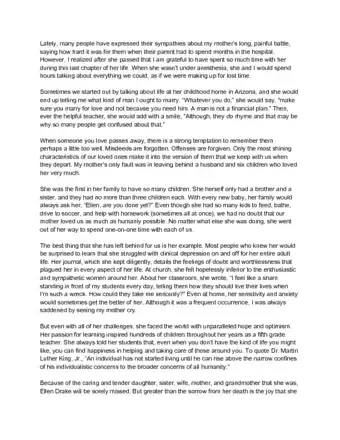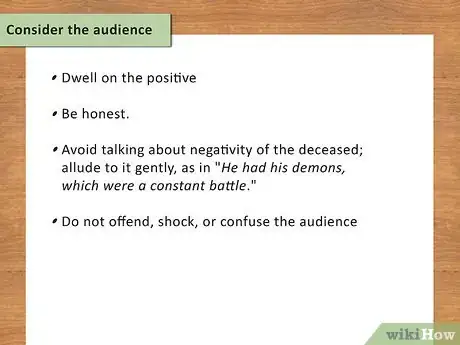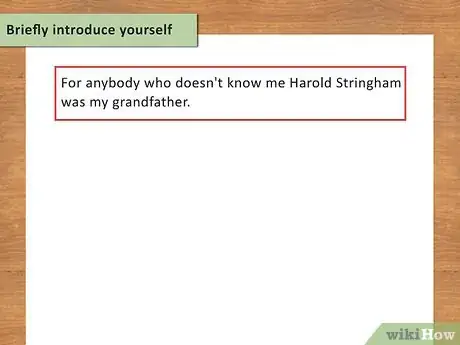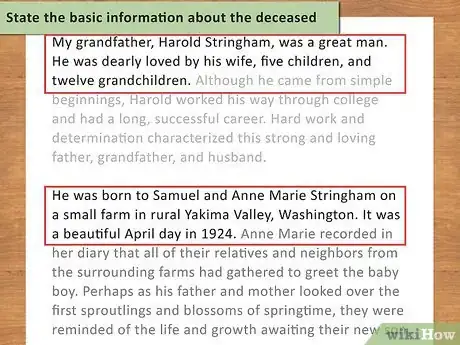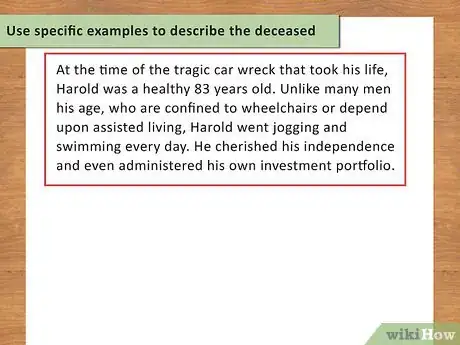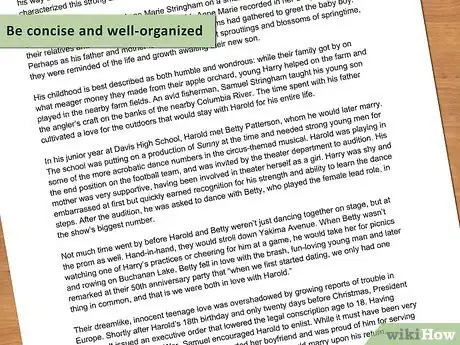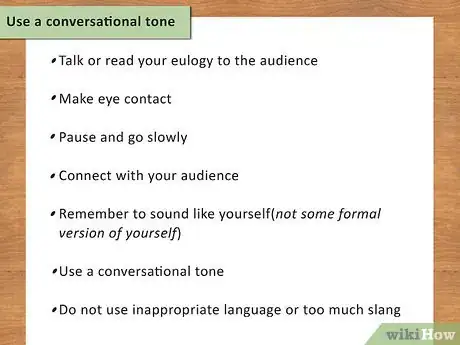This article was co-authored by Rebecca Tenzer, MAT, MA, LCSW, CCTP, CGCS, CCATP, CCFP. Rebecca Tenzer is the owner and head clinician at Astute Counseling Services, a private counseling practice in Chicago, Illinois. With over 18 years of clinical and educational experience in the field of mental health, Rebecca specializes in the treatment of depression, anxiety, panic, trauma, grief, interpersonal relationships using a combination of Cognitive Behavioral therapy, Psychodynamic therapy, and other evidence-based practices. Rebecca holds a Bachelor of Arts (BA) in Sociology and Anthropology from DePauw University, a Master in Teaching (MAT) from Dominican University, and a Master of Social Work (MSW) from the University of Chicago. Rebecca has served as a member of the AmeriCorps and is also a Professor of Psychology at the collegiate level. Rebecca is trained as a Cognitive Behavioral Therapist (CBT), a Certified Clinical Trauma Professional (CCTP), a Certified Grief Counseling Specialist (CGCS), a Clinical Anxiety Treatment Professional (CCATP), and a Certified Compassion Fatigue Professional (CCFP). Rebecca is also a member of the Cognitive Behavioral Therapy Society of America and The National Association of Social Workers.
There are 9 references cited in this article, which can be found at the bottom of the page.
wikiHow marks an article as reader-approved once it receives enough positive feedback. This article received 64 testimonials and 100% of readers who voted found it helpful, earning it our reader-approved status.
This article has been viewed 2,864,765 times.
A eulogy is a speech given at a memorial service in memory of the deceased. You don't have to be a great writer or orator to deliver a heartfelt and meaningful eulogy that captures the essence of the deceased. The best eulogies are brief while being specific, as well as thoughtful and not without the occasional touch of humor. If you want to know how to write a eulogy in spite of being in grief, just follow these steps.
In a few words describe your relationship to the deceased.
Steps
Sample Eulogies
Writing a Eulogy
-
1Decide on the tone. How serious or lighthearted do you want the eulogy to be? A good eulogy does not need to be uniformly somber, just appropriate. Some eulogy-writers take a serious approach, others are bold enough to add humor. Used cautiously, humor can help convey the personality of the deceased and illustrate some of his or her endearing qualities.[1]
- The tone can also be partially determined by the way the deceased passed away. If you're giving a eulogy about a teenager who met an untimely death, then your tone would be more serious than it would if you were giving a eulogy about a grandparent who happily lived to see his ninetieth birthday.
-
2Consider the audience. Write the eulogy with the deceased's family and loved ones in mind. Dwell on the positive, but be honest. If the person was difficult or inordinately negative, avoid talking about that or allude to it gently, as in "He had his demons, which were a constant battle." Make sure you don't say anything that would offend, shock, or confuse the audience.[2]
- For example, don't make any jokes or comments about the deceased that would be a mystery to the majority of the crowd.
Advertisement -
3Briefly introduce yourself. Even if most people in the audience know you, it's still important to introduce yourself. If you're related to the deceased, describe how; if not, say a few words about how and when you met.[3]
-
4State the basic information about the deceased. Though your eulogy doesn't have to read like an obituary or give all of the basic information about the life of the deceased, you should touch on a few key points, such as what his family life was like, what his career achievements were, and what hobbies and interests mattered the most to him. You can find a way of mentioning this information while praising or remembering the deceased.[4]
- Write down the names of the family members especially closed to the deceased. You may forget their names on the big day because you're overwhelmed by sadness, so it's advisable to have them on hand.
- Make sure you say something specific about the family life of the deceased -- this would be very important to his family.
-
5Use specific examples to describe the deceased. Avoid reciting a list of qualities that the person possesses. Instead, mention a quality and then illustrate it with a story. It is the stories that bring the person--and that quality--to life. Talk to as many people as you can to get their impressions, memories, and thoughts about the deceased, and then write down as many memories of your own as you can. Look for a common theme that unites your ideas, and try to illustrate this theme through specific examples.[5]
- If the deceased is remembered for being kind, talk about the time he helped a homeless man get back on his feet.
- If the deceased is known for being a prankster, mention his famous April Fool's prank.
- Pretend that a stranger is listening to your eulogy. Would he get a good sense of the person you're describing without ever meeting him just from your words?
-
6Be concise and well-organized. Outline the eulogy before you start writing. Brainstorm all the possible areas (personality traits, interests, biographical info) to talk about and write them down. When you're ready to write, cover each area in a logical order. Give the eulogy a beginning, middle, and end. Avoid rambling or, conversely, speaking down to people. You may have a sterling vocabulary, but dumb it down for the masses just this once.[6]
- The average eulogy is about 3-5 minutes long. That should be enough for you to give a meaningful speech about the deceased. Remember that less is more; you don't want to try the patience of the audience during such a sad occasion.
-
7Get feedback. Once you're written the eulogy and feel fairly confident in what you've written, have some close friends or family members who know the deceased well read it to make sure that it's not only accurate, but that it does well with capturing the essence of the deceased. They'll also be able to see if you've said anything inappropriate, forgotten something important, or wrote anything that was confusing or difficult to understand.[7]
- You can also ask your friends or family members to edit your eulogy. Though it doesn't need to have perfect grammar since no one else will be reading it, your friends or family members can help you add smoother transitions or remove repetitive phrasing.
Giving a Eulogy
-
1Rehearse the eulogy before the big day. Read the draft of your eulogy aloud. If you have time and the inclination, read it to someone as practice. Words sound differently when read aloud than on paper. If you have inserted humor, get feedback from someone about its appropriateness and effectiveness. Remember, writing is 90% rewriting, so expect to revise your work several times before it shines.[8]
- Rehearsing the eulogy will also help you learn to control your emotions and not get choked up over the speech.
- Try memorizing as much of the speech as you can, or even just reading from notes. Though you should have something to fall back on if you forgot what you were going to say, your words will sound more heartfelt if you're not reading every sentence right off the page.
-
2Have a standby. Though you should hope that you're emotionally prepared to give the speech on the big day, you should have a close friend or family member who has read the eulogy be prepared to read it for you in case you're too choked up to read it. Though you probably won't need one, you'll feel more relaxed just knowing that you have a backup if you need one.[9]
-
3Relax. Before you speak, calm yourself by realizing everyone in attendance is there to support you. It may help to have a glass of water with you on the podium to help you maintain your composure. Just know that everyone will appreciate your efforts and admire you for having written and given a eulogy. You can't fail.[10]
- Tell yourself you're not there to win a speech-giving contest or to impress anyone. You're there to convey your heartfelt feelings about the deceased and that's it.
-
4Use a conversational tone. Talk or read your eulogy to the audience as if you are talking to friends. Make eye contact. Pause. Go slowly if you want. Connect with your audience and share the moment with them; after all, you're not an entertainer, you're one of them. There's no need to be formal when you're surrounded by loved ones who share your grief.[11]
- Remember to sound like yourself, not some formal version of yourself. You can use a conversational tone as long as you don't use inappropriate language or too much slang that might confuse the older members of the audience.
Expert Q&A
-
QuestionWhat are a few ways to start a eulogy for a parent?
 Rebecca Tenzer, MAT, MA, LCSW, CCTP, CGCS, CCATP, CCFPRebecca Tenzer is the owner and head clinician at Astute Counseling Services, a private counseling practice in Chicago, Illinois. With over 18 years of clinical and educational experience in the field of mental health, Rebecca specializes in the treatment of depression, anxiety, panic, trauma, grief, interpersonal relationships using a combination of Cognitive Behavioral therapy, Psychodynamic therapy, and other evidence-based practices. Rebecca holds a Bachelor of Arts (BA) in Sociology and Anthropology from DePauw University, a Master in Teaching (MAT) from Dominican University, and a Master of Social Work (MSW) from the University of Chicago. Rebecca has served as a member of the AmeriCorps and is also a Professor of Psychology at the collegiate level. Rebecca is trained as a Cognitive Behavioral Therapist (CBT), a Certified Clinical Trauma Professional (CCTP), a Certified Grief Counseling Specialist (CGCS), a Clinical Anxiety Treatment Professional (CCATP), and a Certified Compassion Fatigue Professional (CCFP). Rebecca is also a member of the Cognitive Behavioral Therapy Society of America and The National Association of Social Workers.
Rebecca Tenzer, MAT, MA, LCSW, CCTP, CGCS, CCATP, CCFPRebecca Tenzer is the owner and head clinician at Astute Counseling Services, a private counseling practice in Chicago, Illinois. With over 18 years of clinical and educational experience in the field of mental health, Rebecca specializes in the treatment of depression, anxiety, panic, trauma, grief, interpersonal relationships using a combination of Cognitive Behavioral therapy, Psychodynamic therapy, and other evidence-based practices. Rebecca holds a Bachelor of Arts (BA) in Sociology and Anthropology from DePauw University, a Master in Teaching (MAT) from Dominican University, and a Master of Social Work (MSW) from the University of Chicago. Rebecca has served as a member of the AmeriCorps and is also a Professor of Psychology at the collegiate level. Rebecca is trained as a Cognitive Behavioral Therapist (CBT), a Certified Clinical Trauma Professional (CCTP), a Certified Grief Counseling Specialist (CGCS), a Clinical Anxiety Treatment Professional (CCATP), and a Certified Compassion Fatigue Professional (CCFP). Rebecca is also a member of the Cognitive Behavioral Therapy Society of America and The National Association of Social Workers.
Clinical Therapist A eulogy for a parent is something that is extremely difficult to do, especially when thinking about how to put all of your thoughts, memories and feelings into a short speech in front of a crowd of people. Preserving the legacy of a loved one is a tough task. Think about a happy time and take yourself back into that memory. Be there again! Think about what you see, smell and hear. What are the feelings that come back to you and what do you remember the most about this time in your life? Write down a few things that come to mind and see if you can think of something positive to start your eulogy with. Maybe it’s something that you think the person is known for, maybe it’s something personal that you’d like to share or maybe it is an overall feeling that you have now that they’re gone. There is no right or wrong way to start, continue or finish a eulogy. Speak from the heart. Remember, it’s all part of the healing process and grief looks different for everyone. Try and make the eulogy something that is both healing and meaningful for you and not focus as much on the thoughts and perceptions of those around you.
A eulogy for a parent is something that is extremely difficult to do, especially when thinking about how to put all of your thoughts, memories and feelings into a short speech in front of a crowd of people. Preserving the legacy of a loved one is a tough task. Think about a happy time and take yourself back into that memory. Be there again! Think about what you see, smell and hear. What are the feelings that come back to you and what do you remember the most about this time in your life? Write down a few things that come to mind and see if you can think of something positive to start your eulogy with. Maybe it’s something that you think the person is known for, maybe it’s something personal that you’d like to share or maybe it is an overall feeling that you have now that they’re gone. There is no right or wrong way to start, continue or finish a eulogy. Speak from the heart. Remember, it’s all part of the healing process and grief looks different for everyone. Try and make the eulogy something that is both healing and meaningful for you and not focus as much on the thoughts and perceptions of those around you. -
QuestionWhat are some touching things to include in a eulogy for a grandparent?
 Rebecca Tenzer, MAT, MA, LCSW, CCTP, CGCS, CCATP, CCFPRebecca Tenzer is the owner and head clinician at Astute Counseling Services, a private counseling practice in Chicago, Illinois. With over 18 years of clinical and educational experience in the field of mental health, Rebecca specializes in the treatment of depression, anxiety, panic, trauma, grief, interpersonal relationships using a combination of Cognitive Behavioral therapy, Psychodynamic therapy, and other evidence-based practices. Rebecca holds a Bachelor of Arts (BA) in Sociology and Anthropology from DePauw University, a Master in Teaching (MAT) from Dominican University, and a Master of Social Work (MSW) from the University of Chicago. Rebecca has served as a member of the AmeriCorps and is also a Professor of Psychology at the collegiate level. Rebecca is trained as a Cognitive Behavioral Therapist (CBT), a Certified Clinical Trauma Professional (CCTP), a Certified Grief Counseling Specialist (CGCS), a Clinical Anxiety Treatment Professional (CCATP), and a Certified Compassion Fatigue Professional (CCFP). Rebecca is also a member of the Cognitive Behavioral Therapy Society of America and The National Association of Social Workers.
Rebecca Tenzer, MAT, MA, LCSW, CCTP, CGCS, CCATP, CCFPRebecca Tenzer is the owner and head clinician at Astute Counseling Services, a private counseling practice in Chicago, Illinois. With over 18 years of clinical and educational experience in the field of mental health, Rebecca specializes in the treatment of depression, anxiety, panic, trauma, grief, interpersonal relationships using a combination of Cognitive Behavioral therapy, Psychodynamic therapy, and other evidence-based practices. Rebecca holds a Bachelor of Arts (BA) in Sociology and Anthropology from DePauw University, a Master in Teaching (MAT) from Dominican University, and a Master of Social Work (MSW) from the University of Chicago. Rebecca has served as a member of the AmeriCorps and is also a Professor of Psychology at the collegiate level. Rebecca is trained as a Cognitive Behavioral Therapist (CBT), a Certified Clinical Trauma Professional (CCTP), a Certified Grief Counseling Specialist (CGCS), a Clinical Anxiety Treatment Professional (CCATP), and a Certified Compassion Fatigue Professional (CCFP). Rebecca is also a member of the Cognitive Behavioral Therapy Society of America and The National Association of Social Workers.
Clinical Therapist Losing family members can be one of the most difficult things you will have to deal with in life. The death of a grandparent is something that can be hard to write about in a eulogy. One of the best things to do is sit down and think about memories you have had with that person. Think about the memories that stand out the most and think about the feelings or thoughts that are attached to those memories. These may include visions, places, sounds and smells that bring you joy. Reflect on what you think is the most important thing to know about the person who is no longer with you. Eulogies do not have to be long, drawn-out speeches. They can be short and sweet, poems, slideshows, artwork or brief memories shared with loved ones. Try not to put too much pressure on yourself to create something magnificent. The eulogy of a loved one is just as much for your healing as it is for those attending the service.
Losing family members can be one of the most difficult things you will have to deal with in life. The death of a grandparent is something that can be hard to write about in a eulogy. One of the best things to do is sit down and think about memories you have had with that person. Think about the memories that stand out the most and think about the feelings or thoughts that are attached to those memories. These may include visions, places, sounds and smells that bring you joy. Reflect on what you think is the most important thing to know about the person who is no longer with you. Eulogies do not have to be long, drawn-out speeches. They can be short and sweet, poems, slideshows, artwork or brief memories shared with loved ones. Try not to put too much pressure on yourself to create something magnificent. The eulogy of a loved one is just as much for your healing as it is for those attending the service. -
QuestionDo I have to greet the audience before I start to read my eulogy?
 Community AnswerGreeting the audience is appropriate. You should also include an introduction of yourself and a description of your relationship to the deceased. This helps the audience connect with you.
Community AnswerGreeting the audience is appropriate. You should also include an introduction of yourself and a description of your relationship to the deceased. This helps the audience connect with you.
Warnings
- Don't use humor that is either inappropriate or being used just for the laugh. Make it relevant and tasteful. If in doubt, leave it out.⧼thumbs_response⧽
- Don't think that a eulogy has to be a biography of the deceased. On the contrary, you shouldn't sum up his/her entire life. Instead, tell your story--that is, your relationship with the deceased and how he/she affected your life.⧼thumbs_response⧽
References
- ↑ https://www.psychologytoday.com/us/blog/the-empowerment-diary/201805/writing-creative-eulogy-your-beloved
- ↑ https://www.toastmasters.org/magazine/magazine-issues/2020/nov/delivering-a-heartfelt-farewell
- ↑ https://ideas.ted.com/how-to-give-a-eulogy-that-truly-celebrates-the-person-youre-honoring/
- ↑ https://www.grammarly.com/blog/how-to-write-a-eulogy/
- ↑ https://www.talkdeath.com/how-to-write-a-eulogy/
- ↑ https://www.remembranceprocess.com/capturing-a-life-in-words/guide-to-writing-a-eulogy/
- ↑ https://www.funeralwise.com/celebration-of-life/eulogy/
- ↑ https://www.artofmanliness.com/skills/how-to/write-deliver-eulogy/
- ↑ https://www.funeralwise.com/celebration-of-life/eulogy/
About This Article
To write a eulogy, consider the audience and try to focus on the positive aspects of the person’s life while remaining honest. At the beginning of the eulogy, introduce yourself and talk about how you knew the deceased. Continue on to talk about their life, including their family members, where they lived and grew up, what their career achievements were, and what hobbies and interests they were passionate about. Try to include specific examples of the qualities that they possessed by telling stories. When the eulogy is written, be sure to practice before the big day. To learn more strategies about how to read the eulogy in front of others, keep reading below.
